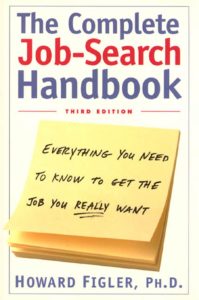TWENTY SKILLS OF THE CAREER SEARCH
Given the end of the academic year is fast approaching, our last entry on the job / career search was the following:
A.R.C.H.I.T.E.C.T – JOB SEARCHING ACRONYM
https://www.archcareersguide.com/a-r-c-h-i-t-e-c-t-job-searching-acronym/
It provides an almost step-by-step process to the job searching process; well, as a compliment, we are discussing the needed skills for a job / career search.
When connecting with architecture students on the job / career search over the years, many think the job search simply consists of created a resume and applying for positions. Nothing can be further from the truth.
As outlined in his book – The Complete Job Search Handbook, Howard Figler, Ph.D. outlines 20 skills of the job / careers search. Each skills provides a brief description; for more details, reference the book as each skill has its own chapter.
Figler, Howard, (1988). The Complete Job Search Handbook. New York, NY: Henry Holt and Company.

SELF-ASSESSMENT SKILLS
VALUES – identify and clarifying the highest priority rewards and satisfactions you hope to obtain in your career, discriminating sharply among competing alternatives.
MONEY – evaluating the importance of financial security and high earnings in your career equation. Deciding how money will rate compared to other sources of satisfaction.
SKILLS – identifying and labeling your most prominent strengths or abilities and choosing the ones you most enjoy using in work situations.
CREATIVITY – learning to envision new and previously unimagined career possibilities by using creative thought process such as adapting, reversing, combining, and magnifying.
DECISION-MAKING – comparing the desirability of several career alternatives, in terms of the factors you consider most significant
REALITY TESTING – acquiring experiences that enable you to compare expectations about a career and your relevant skills with firsthand exposure to the actual field of work. Participating in a career setting without having to make a commitment to it.
DETECTIVE SKILLS
PROSPECT LIST – Building a comprehensive list of people, organizations, and situations that seem most likely to offer the kinds of work you desire.
PERSONAL REFERRAL NETWORK – learning how to create contacts for yourself by establishing relationships with people who can refer you to other people who can help you.
INFORMATION INTERVIEWING – Obtaining information and insight directly from people in careers you may desire to enter; learning what questions to ask and how to conduct the entire exchange.
LIBRARY RESEARCH – Using readily available published materials to quickly obtain data about a target employer, an industry, or a given individual you hope to meet.
COMMUNICATION SKILLS
LISTENING – attending full to another person’s words, feelings, hidden messages, and subtle messages; learning how to direct when you are not listening effectively.
QUESTIONING – using questions in ways that encourage the other person to talk freely and offer more information that will aid your exploration; learning effective and non-effective methods of questioning.
ASSERTIVENESS – taking initiatives in the career-search process; learning non-aggressive methods to interest people in talking with you and providing you with assistance.
SELF-DISCLOSURE – expressing yourself freely and comfortably when asked to talk about your accomplishments, aspiration, and past experiences; practicing self-disclosure.
WRITING – using written forms of communication in a personal way; writing letters to prospective employers that convey your inner motivations and spark a personal response.
SKILLS FOR SELLING YOURSELF
SELF-MARKETING – sensitizing yourself to elements of your background that are most likely to be marketable; collecting evidence of your abilities so it can be presented to an employer.
GAINING EXPERIENCE – numerous ways you can acquire experience that will enhance your presentation to an employer; translating indirect experience into skills and knowledge that are directly relevant to the job you desire.
INTERIM JOBS – accepting stop-gap employment that allows you to survive financially but also makes it possible for you to continue exploration toward your career goals.
SELLING YOURSELF LONG-DISTANCE – practicing your career skills when you are far away from your target geographical area; deciding what skills to use before the move and when to move to the target area.
INTERVIEWING – acquiring the skills necessary to deal with the nin-item hidden agenda in any job interview; learning to understand what interviewers look for and how to follow-up.
Let us know how we can help with your job / career search. Contact us at archcareersguide@gmail.com
